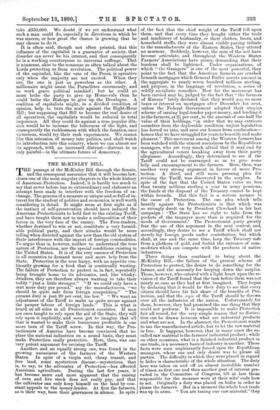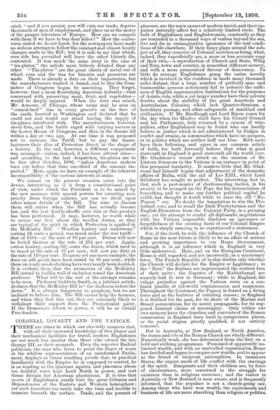THE McKINLEY BILL.
T"passage of the McKinley Bill through the Senate, and the consequent assurance that it will become law, closes one of the most singular chapters in the whole history of American Protection. Indeed, it is hardly too much to say that never before has so extraordinary and elaborate an attempt been made to interfere with the freedom of ex- change. The genesis of a measure so unique and so full of in- terest for the student of politics and economics, is well worth considering in detail. It might seem at first sight as if the instinct of self-preservation should have induced the American Protectionists to hold fast to the existing Tariff, and have taught them not to make a redisposition of their forces in the very face of the enemy. The Free-traders, whether destined to win or not, constitute a very formid- able political party, and their attacks would be more telling when directed against the new than the old system of State interference with. the import of foreign commodities. To argue thus is, however, neither to understand the true nature of Protection, nor the special conditions existing in the United States. It is of the very essence of Protection in all countries to demand more and more help from the State. Protection is the true harpy, with an appetite con- tinually growing for a food that is continually wasting. The failure of Protection to protect is, in fact, repeatedly being brought home to its advocates, and, like whisky- drinkers, they are therefore always wanting to take their toddy " just a little stronger." "If we could only have a cent more duty per pound," say the manufacturers, " we should be quite safe from foreign competition." " The present duty is just 20 per cent. too low." " We want an adjustment of the Tariff to make us quite secure against the pauper labour of foreign lands." This is what is heard on all sides in all Protectionist countries. If men are once taught to rely upon the aid of the State, they will rely upon it implicitly, and soon get to imagine that all that is wanted to make their businesses profitable is one more turn of the Tariff screw. In this way, the Pro- tectionists of America have become convinced that to- place the national industries on a sound basis, they must make Protection really protective. Here, then, was one very potent argument for revising the Tariff.
Another, and an equally strong one, was found in the growing uneasiness of the farmers of the Western States. In spite of a virgin soil, cheap transit, and free land, some mysterious disease—mysterious, that is, to say, to the advocates of Protection—has affected American agriculture. During the last few years, it has become more and more apparent that the raising of corn and live stock does not really pay, and that the cultivator can only keep himself on the land by con- stant appeals to the money-lender. At first the farmers, as is their way, bore their grievances in silence. In spite of, the fact that the chief weight of the Tariff fell upon them, and that every time they bought either the tools and machinery of husbandry, or their clothes, boots, and household stuffs, they were almost visibly paying tribute to the manufacturers of the Eastern States, they uttered no murmur. Suddenly, however, the men of the soil have become articulate, and throughout the Western States Farmers' Associations have arisen, demanding that their burdens shall be lightened. Under organisations, of which " the Grangers " is one of the most powerful, they point to the fact that the American farmers are crushed beneath mortgages which General Butler asserts amount in the aggregate to nearly seven hundred millions sterling, and propose, in the language of revolution, a series of wildly socialistic remedies. How far the movement has been carried may be, judged by the fact that "the farmers of Kansas " lately declared that they would pay no more taxes or interest on mortgages after December 1st next, unless the Federal Government adopted their utopian scheme of issuing legal-tender paper-money, and lending it to the farmers, at 2-1 per cent., to the amount of one-half the value of their holdings, " in order that we may extricate ourselves from the deplorable condition unjust legislation has forced us into, and save our homes from confiscation— homes that we have struggled for years to beautify and make pleasant." This movement among the Western farmers has been watched with the utmost uneasiness by the Republican managers, who are very much afraid that it may end by the agricultural voters breaking away from their party allegiance. Accordingly, they determined to see if the Tariff could not be rearranged so as to give some help and encouragement to the farmers. Here, then, was another very strong argument in favour of more Pro- tection. A third, and still more pressing plea for revising the Tariff, was discovered in the surplus. In spite of the fact that the United States votes no less than twenty millions sterling a year in army pensions, the funds at the disposal of the Treasury cannot be kept within bounds. But this fact is a serious menace to the cause of Protection. The one plea which tells heavily against the Protectionists is that which was so strongly dwelt on by President Cleveland in his last campaign : ' The State has no right to take from the pockets of the taxpayer more than is required for the needs of Government.' The Protectionist party greatly fear the use of this argument in the next contest, and, accordingly, they desire to see a Tariff which shall not merely lay foreign goods under contribution, but which shall, at one and the same time, keep the Treasury safe from a plethora of gold, and forbid the entrance of com- modities which can compete with the products of native industries.
Three things thus combined to bring about the McKinley Bill,—the failure of the present scheme of Protection to protect, the desire to do something for the farmer, and the necessity for keeping down the surplus. Those, however, who entered with a light heart upon the re- vision of the Tariff found that the task before them was not nearly so easy as they had at first imagined. They began by declaring that it would be their duty to see that every citizen should have his fair share of the benefits of Pro- tection, and that the aegis of the Tariff should be thrown over all the industries of the nation. Unfortunately for them, however, they had promised the one thing that they could not perform. It is impossible to make Protection fair all round, for the very simple reason that no distinc- tion can be drawn between what are industrial products and what are not. In the abstract, the Protectionist wants to tax the manufactured article, but to let the raw material in free. It happens, however, that in many cases the so- called raw material is the farmers' industrial product; while on other occasions, what is a finished industrial product in one trade, is a necessary basis of industry in another. These facts were soon unpleasantly forced upon the Republican managers, whose one and only- desire was to please all parties. The difficulty in which they were placed in regard to hides is characteristic of the whole situation. The duty here was taken on and off an almost incredible number of times, as first one and then another gust of interest pre- vailed in the Committee of Congress, till at last those responsible for the measure were at their wits' ends how to act. Originally a *duty was placed on hides in order to please the farmers. But in a moment the whole boot trade was up in arms. " You are taxing- our raw material," they cried, " and if you persist, you will ruin our trade, deprive thousands of men of employment, and place us at the mercy of the pauper labourers of Europe. How can we compete with them if we have to buy dear hides ?" How the contro- versy ended we do not know, for the newspapers have made no serious attempt to follow the constant and almost hourly changes made in the Bill ; but it is safe to say that which- ever side has prevailed will leave the other bitterly dis- contented. It was much' the same story in the case of " tin-plates," the article more bitterly debated than any other. " Tin-plates " are the great sheets of metal out of which cans and the tins for biscuits and preserves are made. There is already a duty on their importation, but the manufacturers wanted it raised, and to this the Com- mittee of Congress began by assenting. They forget, however, that a most flourishing American industry—that concerned with preserving meat, fruit, and vegetables— would be deeply injured. When the duty was raised, Mr. Armour, of Chicago, whose name may be seen on " corned-beef " tins in every grocer's on the face of the earth, hurried to Washington and declared that he could not and would not stand having the supply of tin-plates interfered with. The manufacturers, however, stood firm, and the battle raged with varying success in the Lower House of Congress, and then in the Senate till within a day or two ago. At one time it was proposed not to increase the Tariff, but to pay the manu- facturers their slice of Protection direct, in the shape of a bounty. In the end, however, a different compromise was arranged--unless, indeed, it has been altered since— and according to the last despatches, tin-plates are to be free after October, 1896, " unless American makers turn out before that time one-third of the amount im- ported." Here, again, we have an example of the inherent incompatibility of the various interests at stake.
We cannot on the present occasion enter into the device, interesting as it is from a constitutional point of view, under which the President is to be armed by the new measure with special powers for extorting reci- . procity from foreign nations, nor can we dwell upon other minor details of the Bill. The time to discuss them will arrive when the Bill has actually become Jaw, and the last double-shuffle over this or that product has been performed. It may, however, be worth while to notice one fact about the woollen duties, as they are typical of the spirit in which Protection is applied in the McKinley Bill. " Woollen hosiery and underwear," costing 32 cents a pound, was taxed under the war tariff— that of 1864 at the rate of 90 per cent. Duties will now be levied thereon at the rate of 214 per cent. Again, cotton hosiery, costing 621 cents the dozen, which used to be taxed at the rate of 35 per cent., will now pay duty at the rate of 110 per cent. To quote yet one more example, the dues on silk goods have been raised by 30 per cent., while those on ready-made clothing have very nearly been doubled. It is evident, then, that the promoters of the McKinley Bill intend to build a wall of exclusion round the American producer. What will be the end of the attempt remains to be seen. Professor Goldwin Smith, in a jubilant article, declares that the McKinley Bill is " the darkness before the dawn." It is always dangerous to prophesy, but we are inclined to believe him. The Bill cannot help the farmers, and when they find this out, they are extremely likely to withdraw their support from the Protectionist party. If the Democrats return to power, it will be as virtual Free-traders.







































 Previous page
Previous page